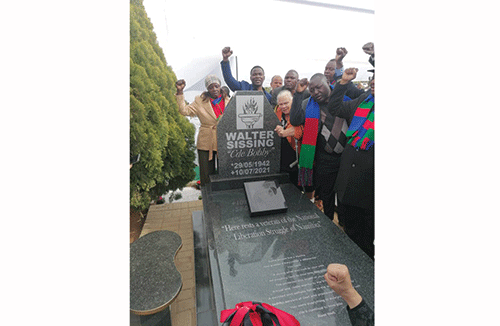Scores of mourners braved the chilly weather that has been hitting the city over the last couple of weeks, to gather at the Pionierspark cemetery, south of Namibia’s commercial capital Windhoek, on Saturday morning. Well, the occasion was the formal tombstone unveiling ceremony for an unsung national hero, one Walter ‘Bobby’ Sissing, famously known as Uncle Bob. The well-attended commemoration was preceded by reading of scriptures from the Bible, accompanied by hymns and soul-soothing songs by local artists.
Leading solo artist George Longane led the congregation in song and had the appreciative mourners in absolute awe when he effortlessly performed the touchy lyrics of The Winans’ gospel hit song ‘Tomorrow’.
Admittedly, it was indeed a celebration of a life well lived. A few selected speakers, including Sissing’s comrades from the ruling SWAPO party and his protégé Lionel ‘Boet’ Mathews, took turns to shower the uncompromising departed political and community activist with praise for his unwavering fight against apartheid. Uncle Bob was resolutely opposed to the institutionalised dehumanisation of indigenous Namibians through racial segregation during the height of the despised South African apartheid system.
Nonetheless, all these fancy words and oral accolades somehow left a bitter taste in the mouth, as Uncle Bob was not genuinely accorded the recognition deserving of a national hero while he was still alive. Murmurs of discontent could be heard among the mourners, who strongly believed the man should have gotten his flowers while he was still alive so that he could smell them.
Lest we forget, Uncle Bob was the last man standing when law enforcement authorities casually abolished racial segregation across all sporting disciplines in apartheid South West Africa in 1977. Uncle Bob would have none of that, arguing, and rightly so, that one cannot play a normal sport in an abnormal society. The long-haired hippy-lookalike uncle Bob put his body on the line when the clearly revengeful white-dominated City Councils banned the breakaway National Super Soccer League (NSSL) from using public football pitches across the country.
Uncle Bob availed himself of the Khomasdal field, which by default resorted to the Coloured’s administration.
He also managed to convince his counterparts in the coastal town of Walvis Bay to avail a sports field in Narraville. The man did wonders for the overall development of domestic football, and the only reasonable reward is to rename the Khomasdal sports field after him.
Tellingly, Uncle Bob boasts an incredible sporting resume, having led a life-threatening protest against the puke-inducing, systematic, racially motivated decision to stop a mixed-race Coloured’s/Bantu Invitational football team from participating in a South African Inter-Provincial Tournament in neighbouring South Africa in 1966.
The racist white authorities ordered the team to be split into two groups, one comprising coloured people and one for Bantus (blacks).
The militant, fearless Uncle Bob would have none of that and told the law enforcers in no uncertain terms where to get off. As a result, the tour was subsequently called off.


